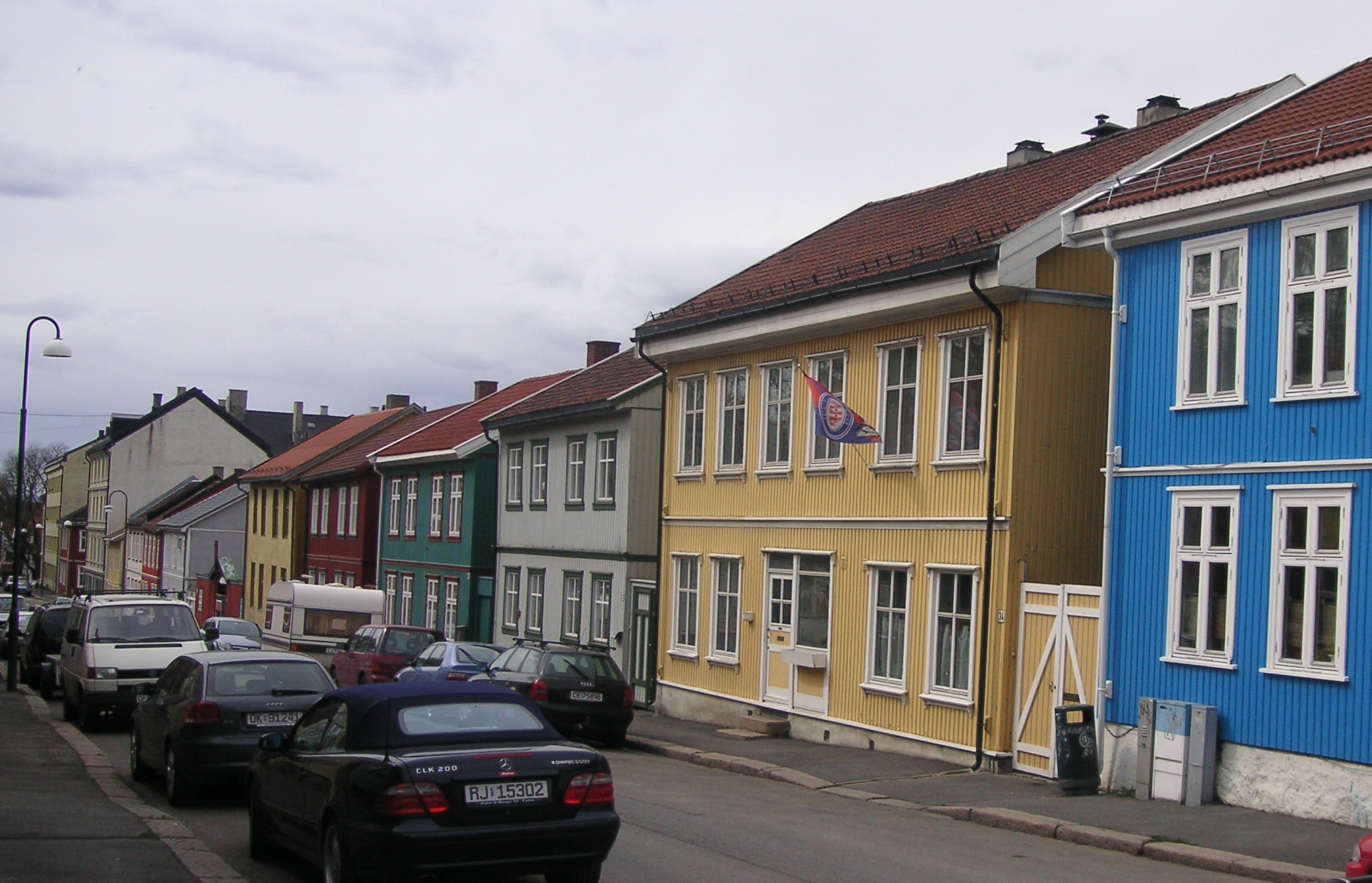Return to the search form Return to your search results
Oslo Metropolitan University Exchange
Fast Facts
Sessions Offered:
Fall, Spring, Academic Year
Location:
Oslo, Norway
Credit:
Transfer
Eligibility:
Students must have a GPA of 3.0. Students must be in good academic and disciplinary standing.
Application Due:
Fall or Academic year: March 1
Spring: Sep 10
Program Cost:
Click the Application tab.

The University of Iowa has a partnership with Oslo Metropolitan University (OlsoMet). This partnership allows UI students to study for the semester or academic year fully integrated with their Norwegian peers while attending classes and living in local student housing. Oslo Metropolitan University offers a wide range of classes taught in English.
You can learn more about the study abroad experience at OsloMet on their Exchange Student Website.
Academic Program
Oslo and Akershus University College of Applied Sciences became Oslo Metropolitan University, or OsloMet, in January of 2018 when the Norwegian government granted them university status. OsloMet has robust selection of courses offered in English. You can the course catalog for courses available to exchange students on their study abroad course catalog. Be sure to click the For Exchange Students button before searching.
You will enroll in three to four courses, and earn 12 - 18 semester hours. Contact your study abroad advisor for details on how the credit from OsloMet translates to UI semester hours.
Flexibility Regarding Course Offerings
Foreign universities are typically unable to provide a final course catalog for the upcoming semester until shortly before the semester begins. Students usually do not know which specific classes they can take before arriving abroad, and they usually do not register for classes until they arrive in their host country- this means that there is no way to guarantee that you will be able to enroll in your preferred courses. Your final course schedule may not be finalized until you are already abroad.
Because of these differences, all students must meet with their academic advisor(s) before going abroad to discuss how the differences in course availability will affect their degree progress and graduation plans. It is important to develop a back-up plan in case your preferred courses are not available when you enroll in your courses abroad.
OsloMet's Grading System
As a study abroad student, you are required to undertake the same form of assessment as the local students in order to earn credit for your work. The grading system in at your host university is significantly different from the US system. Iowa is not able to 'translate' the marks you earn on this program to US letter grades. Instead, passing grades for this program will be recorded with a grade of R on the UI transcript. Students applying for further graduate or professional training may be asked to present an original transcript reflecting the actual marks received.
Transcripts
Transcripts for the Fall semester are typically available by early December, and transcripts for the Spring semester are typically available by August. Transcripts are not automatically sent to Iowa by OsloMet- you will need to request that your transcript is sent to Iowa in order to receive credit for your work. When your transcript is available, OsloMet will contact you and you will need to use their secure system to ask that your transcript is sent to the University of Iowa. You can expect your credit to be applied to your UI degree around 2-3 months after you have your transcript sent to the University of Iowa.
Applying credit toward a UI degree
Unless UI Study Abroad has an approval on file for the courses you take abroad to be applied toward a specific major, minor, certificate, or general education requirement, you will receive general elective credit for your courses. The only exception to this is courses involving cooking or food/alcohol tasting- these courses are not eligible for credit at the University of Iowa.
If you plan to apply the credit you receive for your courses abroad to a major, minor, certificate, or general education requirement, contact your UI study abroad advisor for details on the process.
Cultural Activities
OsloMet offers several options for cultural immersion and exploration, including student organizations, and a 'buddy' program. You can learn more about these options on OsloMet's Student Life page.
You can also enroll in a Norwegian language course, which will help you connect more easily with the local culture. Find details about this course on OsloMet's Norwegian Language for Foreign Students page.
Program Dates
Program dates vary from year to year, but typically follow the University of Iowa’s academic calendar. OsloMet's fall semester typically runs from early Augsut - late December, and their spring semester is typically from early January - late June. The specific dates for your program varies depending on the specific courses you're enrolled in. You will receive your final program dates from OsloMet shortly after you have been accepted to the program. Contact your study abroad advisor for details about the specific dates of your program.
Arrival Date
Plan to arrive in at your host university the day before official program activities begin. For example, if the program orientation starts on August 12, plan to arrive on August 11. Be sure to review the Travel Arrangements section for more information before purchasing your plane tickets.
For More Information
Steps to Studying Abroad
- Before initiating an application for this program, students must complete a Discover Study Abroad session at the University of Iowa.
- After completing the Discover Abroad session, students will receive an email with their study abroad advisor assignment.
- Once assigned, students must meet with their study abroad advisor to receive program application instructions.
Study Abroad
1111 University Capitol Centre
Iowa City, IA 52242
Phone: 319-335-0353
Email: study-abroad@uiowa.edu
Oslo Metropolitan University
Oslo and Akershus University College of Applied Sciences became Oslo Metropolitan University, or OsloMet, in January of 2018 when the Norwegian government granted them university status. Oslo and Akershus University College (HiOA) was established in 2011 following the merger of Oslo University College and Akershus University College. Most of the university college is located in the city center of Oslo along the Pilestredet street, with subsidiary campuses in the suburbs of Sandvika and Kjeller in the county of Akersuhus. HiOA is the largest state university college in Norway, with more than 18,000 students and 1,900 employees. It has higher education programs at the bachelor's, master's and PhD levels. It offers studies and conducts research in health professions,social sciences,liberal arts, and other fields.
Oslo

Oslo is the capital of Norway and the most populous city in the country, with about 650,000 residents. The city was founded in 1040 as a trading post. In 1624, the city was destroyed by fire so it was moved closer to Akershus Fortress, a medieval castle that was built to protect Oslo. Today the city is the economic and governmental center of Norway. In Oslo students can visit art museums like the Munch museum, the ski museum at Holmenkollen ski Jump or the Vigeland Sculpture Park. The city is surrounded by a forested area with lakes, rivers and several hundred miles of paths and trails, for skiing in the winter and hiking and cycling the rest of the year. The metro can take you to the trails or any of the small islands and beaches that are near the city.
Norway

Outside of the cities, Norway is mostly very rugged terrain. Mountainous regions cover most of Norway, interspersed with valleys, fjords and the occasional glacier. The country maintains a combination of a market economy and a Nordic welfare model with universal health care and a comprehensive social security system. It has extensive reserves of petroleum, natural gas, minerals, lumber seafood, fresh water and hydropower.
US Department of State Country Information
The US Department of State provides safety and security information for every country of the world to help you assess for yourself the risks of travel. Each country information page contains a Travel Advisory, Alerts, and other important details specific to that country that could affect you.
Pay close attention to the entry and exit requirements, local laws and customs, health conditions, and other details to help decide whether traveling to any given country is right for you. Non-US citizen travelers may also wish to seek guidance from the embassy of their country of citizenship. The UI International Travel Policy for Students addresses restrictions on student travel to high-risk locations and engagement in high-risk activities abroad.
Living Arrangements
After you are accepted by OsloMet, you will book your accommodations through the Student Welfare organization (SiO) using their Accommodation for International Students page. Accommodations fill up quickly, so it will be important for you to book your accommodations as soon as you can.
University of Iowa students are required to stay in housing arranged through the SiO. Iowa students cannot stay in privately arranged housing.
Housing Costs and Deposits
Housing costs will be paid directly to your host institution. You will receive details about how to pay for your housing abroad from your host institution prior to departure. You should plan to pay a housing deposit early in the semester prior to your departure.
Estimated housing costs are provided under the Application tab above.
Passport
All students need a valid passport to participate in this program. If you do not have a passport, it is important that you apply for one as soon as possible to ensure you receive it before the program begins. US citizens can find more information about how to apply for a passport on the US Department of State’s website.
Important notice for students without a valid passport or whose passport will expire within the next 12 months:US citizens can find more information about how to renew a passport on the US Department of State’s website.
Students with a valid passport should check the expiration date. Passports must be valid for at least 6 months AFTER the anticipated return to the US from studying abroad. If your passport is not valid for at least 6 months after your anticipated date of return to the US, you must renew your passport before applying for the visa you will need to enter your host country.
Expedited processing service is available for US passports (although this still takes several weeks and is at an additional cost). UI Study Abroad encourages students to ask the passport agency at the time of application whether expedited service is recommended.
Non-US Citizens
Students who are not US citizens should contact their consulate for more information if they need to get a new passport or renew their passport.
Travel Arrangements (Flights)
Purchasing Plane Tickets
UI Study Abroad will not arrange a group flight to your study abroad destination. You will purchase plane tickets to your host country on your own, though UI Study Abroad can assist by providing advice regarding airline booking options.
You are advised not to purchase your plane tickets until:
- You have received an official offer of acceptance from your host university, and have submitted confirmation materials to UI Study Abroad.
- You have finalized your housing arrangements abroad.
- You are aware of 1) the semester start date (including orientation programing) and 2) the move-in date for your accommodations abroad.
- You have received your visa (if required- contact your study abroad advisor for more information).
If you are studying abroad during the fall semester or for the academic year, plan to purchase your plane tickets by June or July. If you are studying abroad during the spring semester, plan to purchase your plane tickets by early November.
Arrival Plans
Plan to arrive in your host country as early as possible the day before official program activities begin. To ensure that you meet your host country's immigration requirements and that you are covered by international health/travel insurance, do not arrive in your host country sooner than one day before the official start of program activities.
If you have questions about purchasing plane tickets, or would like to coordinate your travel with other UI students, please contact your UI study abroad advisor.
Local Transportation
Students will use convenient and inexpensive public transportation to travel in and around Oslo.
Eligibility
This program is open to University of Iowa students who fulfill the following requirements:
- Good academic and disciplinary standing- Students must be in good academic and disciplinary standing at the University of Iowa. Students placed on either academic or disciplinary probation for any period of time overlapping with the study abroad program dates are ineligible to study abroad on a University of Iowa program. Academic and disciplinary history will also be considered when determining whether a student is prepared to represent the University of Iowa as part of this program. Students who are not in good standing at any point overlapping with the program dates will have their acceptance revoked, and will be responsible for the associated late withdrawal fees.
- Minimum 3.0 UI and Transfer GPA- Students must have a minimum 3.0 UI and Transfer GPA to participate in this program (transfer GPAs lower than 3.0 may be considered on a case-by-case basis).
- Sophomore, Junior, or Senior standing required- Students must have sophomore, junior, or senior standing at the time the program begins. First year students cannot participate in this program.
- Approval by UI study abroad advisor- A student’s application must be reviewed and approved by their University of Iowa study abroad advisor.
- Acceptance by host institution- Students must be accepted by their host institution as a temporary visiting student. Acceptance by the host institution is typically automatic for students that have been nominated by their study abroad advisor, but the final acceptance decision is made by the international student office and the sponsoring departments at the host institution based on their own internal requirements.
- Attendance at mandatory orientation programming- Students must attend all in-person and online pre-departure orientation programming presented by UI Study Abroad.
- Clear interest and commitment- Students must demonstrate a clear academic or personal interest in the program’s subject matter, and a commitment to engage responsibly in coursework abroad.
- Demonstrated preparedness and maturity- Students must demonstrate preparedness to take on the heightened responsibilities associated with international study and travel. Students must demonstrate a commitment to behave responsibly abroad while respecting cultural differences. Students are expected to obey both local laws and program directives conveyed to participants before and during the program. The University of Iowa Code of Student Life applies to all program participants while abroad.
Costs
Students will be responsible for paying many of their program costs through their University of Iowa U-Bill, while other costs will be out-of-pocket costs paid by the student directly to vendors before and after going abroad. Refer to the cost sheets below for details on the costs associated with this program.
The cost sheets outline the total estimated costs associated with participating in this program and can be used for financial aid purposes. They include fees charged on students’ U-Bill as well as out-of-pocket expenses. Actual out-of-pocket expenses will vary from individual to individual. Quoted estimates are conservatively high, yet realistic.
Costs for future sessions are usually similar to the current session, however students can expect a modest increase in overall costs each session. Final cost sheets for future sessions are typically available early in the semester before the session begins.
Cost Sheets
 Cost Sheet- OsloMet- Spring 2026
Cost Sheet- OsloMet- Spring 2026
The cost sheet includes the following fees:
- University of Iowa Tuition and Fees, housing, flight, and other costs of attendance.
- University of Iowa Study Abroad Administrative Fees
- University of Iowa’s CISI health insurance
Personal Travel Costs
Costs for personal travel are not included in the cost estimates provided on the cost sheet. If you plan to travel outside of your host city or country during or after your study abroad program, you will need to budget for additional funds to cover the cost of your personal travel.
Costs charged to the U-Bill
- Application Fee- (charged at the time of application, before financial aid/scholarships are disbursed.)
- University of Iowa Tuition & Fees- (charged shortly before departure.)
- Study Abroad Fees- (charged shortly before departure.)
- CISI Health Insurance- (charged shortly before departure.)
Out-of-pocket costs (not charged to U-Bill)
- Round trip airfare (paid by student directly before financial aid/scholarships are disbursed)
- Food (paid by student at their discretion while abroad)
- Housing (paid by student)
- Visa fees (paid by student before traveling to Norway and before financial aid/scholarships are disbursed.)
- Local transportation (paid at student’s discretion while abroad)
- Cell phone (paid as needed while abroad)
- Passport (paid by student prior to departure, before financial aid/scholarships are disbursed)
- Textbooks (paid as needed while abroad)
- Medical exam/immunizations (paid by student as needed prior to departure, before financial aid/scholarships disburse)
- Personal expenses and personal travel (paid by student at their discretion while abroad)
Scholarships & Financial Aid
For more information about receiving financial aid while studying abroad, please review the following:UI Financial Aid Information
You can find more information about options for funding your study abroad experience including scholarships on Undergraduate Scholarships for Study Abroad.
How to Apply
This is a two-part process. First, you will submit an application to the University of Iowa. Then, if approved, you will submit a separate application to the host university abroad. The host university abroad makes the final acceptance decision.
- Meet with the appropriate study abroad advisor to discuss your study abroad plans well ahead of the application deadline. Your application will not be approved until you've completed this step. You can set up an appointment with your study abroad advisor through the Advising Appointment section of your MyUI account.
- Meet with your academic advisor(s) to discuss how this program will fit your graduation plans. Make a back-up plan in case your preferred courses are not available when you register for courses abroad (see the Flexibility Regarding Course Offerings section for more information.)
- If you and your academic advisor agree that the program is a good match for you, complete the UI Study Abroad application. Please note that the non-refundable $50 application fee will be charged to your U-Bill as part of this online application.
- If you are eligible to participate and there are sufficient spaces available, you will be nominated to study at the host university by UI Study Abroad.
- Once nominated, you will receive details about how to complete the visiting student application for the host university abroad. Your application will be reviewed by the host university, and they will contact you with your final acceptance decision.
- Academic Year and Fall semester students can expect to receive their final acceptance decision from the host university by early summer, and Spring semester students can expect to receive their final acceptance decision from the host university by late November.
Post-Acceptance
Confirmation
If you are accepted to your program, you will be asked to commit to participating in your program by submitting the University of Iowa Confirmation of Participation form, and by completing requirements for your host university.
After you have formally confirmed your plans to participate, you will work both with UI Study Abroad and your host university. Follow instructions from both. Later in the semester, your UI study abroad advisor will contact you regarding orientation sessions, registration, and other required UI procedures and documentation.
Application Deadline
Applications for the Fall and Academic Year sessions are due on February 24.
Applications for the Spring session are due on September 10.
Limited Admission
Admission to this program is limited to a small number of students each semester, based on the current exchange balance with the host university.
Complete applications from eligible students will be considered on a first come, first served basis. Interested students are encouraged to submit complete application materials as soon as possible to increase their chances of securing a place in the program during their chosen session.
Enrollment for the Fall 2026 and Academic Year 2026 - 2026 sessions is limited to 4 semester students.
Contact your study abroad advisor for updates on available spaces for the upcoming sessions.
Health & Safety Planning
Students should carefully review the following materials starting at least two months prior to departure:Iowa Regents CISI Health Insurance Information
Immigration/Visa
All program participants are required to complete immigration requirements to enter and study in your host country. UI Study Abroad and your program provider/host institution abroad will provide you with immigration instructions prior to departure.
Note that permission to enter and study in your host country is provided exclusively by the host country’s government based on that country's immigration requirements. Your host country’s immigration requirements may include considerations related to specific national origin, national heritage, criminal background status, and similar issues that can make it impossible to receive permission to enter the country in some cases. Contact your UI study abroad advisor for more information.
It is essential that you thoroughly review all of your immigration materials before you leave for your host country to ensure that they are absolutely complete and accurate. It is entirely your responsibility to ensure that all of your immigration materials are in order and fully accurate before you leave for your host country. If any of your immigration materials contain inaccurate information of any kind, contact your UI study abroad advisor immediately to discuss your options.
Do not take steps to complete your host country’s immigration requirements until you receive more information from UI Study Abroad.
Review the UI Study Abroad Travel Documentation website for further guidance on the immigration/visa process.
Orientation
In order to prepare for your time abroad, you are required by the University of Iowa to complete two orientations. These may be in addition to orientations provided by your on-site provider. See below for more information.
Online Education Abroad Pre-Departure Orientation
You are required to complete the International Programs ICON course "Education Abroad Pre-Departure Orientation" prior to departure. This orientation is mandatory for all students going abroad under the auspices of the University of Iowa. It covers many practical matters about living overseas, such as health and safety, communication, money, goals, and much more. You will be enrolled in this course by International Programs and an email will be sent to you once enrolled. If you have any questions, you can email safety-abroad@uiowa.edu.
Program-Specific Orientation
This orientation will be facilitated by your UI study abroad advisor and will cover content specific to your program and host country. It could be conducted in a group setting or one-on-one depending on your type of planned activity abroad. Your study abroad advisor will send you more information about this mandatory in-person session.




